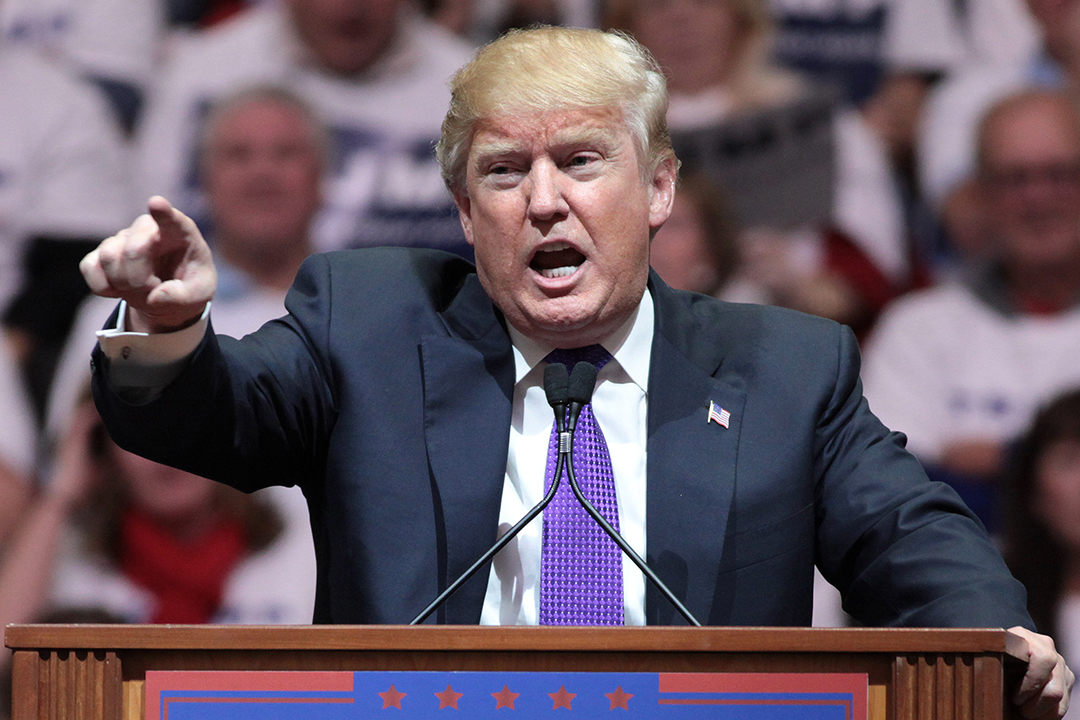Gage Skidmore photo
Donald Trump speaking with supporters at a campaign rally in 2016
***
Say Good-Bye to the Social Contract
by Henry A. Giroux
December 26, 2016
In this interview (below) with The Real News Network, Henry A. Giroux argues that while it is hard to believe that Trump has appointed to high government positions a number of religious fundamentalists, conspiracy theory advocates, billionaires, misogynists, climate change deniers, and retrograde anti-communists, this should come as no surprise given the anti-democratic conditions that produced Trump in the first place. Not only do these individuals uniformly lack the experience to take on the jobs for which they were nominated, they are unapologetic about destroying the government agencies in which they have been put in charge.
These appointments are indicative of the policy decisions that will be put in place that will both increase the attack on democratic institutions and public goods as  well as the degree to which power will be further consolidated in the hands of the financial elite. While there is little doubt that Trump’s gaggle of appointees represents a deep embrace of ignorance, crony capitalism, and a disdain for the institutions that give legitimacy to the social contract and the welfare state, these administrative heads represent the front guard of the dark times that are to come, times that will be marked by a combination of state repression and unchecked collusion among big corporations, banks, and the ultra-rich. Yet, not only has Trump turned a number of important cabinet positions to the most criminogenic elements of neoliberalism, he has also filled cabinet and high level positons with generals insuring that the militarization of American society will not simply be continued but accelerated. This mix of incompetent and mean-spirited billionaires and generals represents support of the worst elements of militarism and neoliberalism—a war on education, support for austerity policies, and an attack on social provisions, the poor, workers, unions, and the most vulnerable. Under Trump’s administration, a war culture will morph with an updated version of the Gilded Age. Trump’s government of billionaires and militarists makes clear that the next few years will be governed by ruthless financial elite who will give new meaning to an updated version of authoritarianism that will accelerate the misery, suffering, and exploitation of a wider sector of American society.
well as the degree to which power will be further consolidated in the hands of the financial elite. While there is little doubt that Trump’s gaggle of appointees represents a deep embrace of ignorance, crony capitalism, and a disdain for the institutions that give legitimacy to the social contract and the welfare state, these administrative heads represent the front guard of the dark times that are to come, times that will be marked by a combination of state repression and unchecked collusion among big corporations, banks, and the ultra-rich. Yet, not only has Trump turned a number of important cabinet positions to the most criminogenic elements of neoliberalism, he has also filled cabinet and high level positons with generals insuring that the militarization of American society will not simply be continued but accelerated. This mix of incompetent and mean-spirited billionaires and generals represents support of the worst elements of militarism and neoliberalism—a war on education, support for austerity policies, and an attack on social provisions, the poor, workers, unions, and the most vulnerable. Under Trump’s administration, a war culture will morph with an updated version of the Gilded Age. Trump’s government of billionaires and militarists makes clear that the next few years will be governed by ruthless financial elite who will give new meaning to an updated version of authoritarianism that will accelerate the misery, suffering, and exploitation of a wider sector of American society.
Trump’s presence in American politics has made visible a plague of deep seated civic illiteracy, a corrupt political system, and a contempt for reason; it also points to the withering of civic attachments, the collapse of politics into the spectacle of celebrity culture, the decline of public life, the use of violence and fear to numb people into shock, and a willingness to transform politics into a pathology. Trump’s administration will produce a great deal of violence in American society, particularly among the ranks of the most vulnerable: poor children, minorities of color, immigrants, women, climate change advocates, Muslims, and those protesting a Trump presidency.
What must be made clear is that Trump’s election and the damage he will do to American society will stay and fester in American society for quite some time because he is only symptomatic of the darker forces that have been smoldering in American politics for the last 40 years. What cannot be exaggerated or easily dismissed is that Trump is the end result of a long-standing series of attacks on democracy and that his presence in the American political landscape has put democracy on trial. If the authoritarianism of the Trump era is to be challenged, it must begin with a politics that is comprehensive in its attempts to understand the intersectionality of diverse forces of oppression and resistance. That is, on the one hand, it must move towards developing analyses that address the existing state of authoritarianism through a historical and relational lens that brings together the diverse registers of oppression and how they are both connected and mutually reinforce each other. On the other hand, such a politics must, as Robin D.G. Kelley has noted, “move beyond stopgap alliances”[i] and work to unite single issue movements into a more comprehensive and broad-based social movement that can make a viable claim to a resistance that is as integrated as it is powerful. The rule of the billionaires and militarists threaten not just democracy but the existence of the planet. The stakes for both justice, if not survival, are more important than ever. There is no room for resignation, internecine squabbles, and despair. Resistance must take on the challenge of creating an informed public, the need to develop new forms of non-violent resistance, and mobilize a collective sense of outrage mixed with a need for disciplined and focus action.
[i] Robin D. G. Kelley, “After Trump,” Boston Review (November 15, 2016). Online: http://bostonreview.net/forum/after-trump/robin-d-g-kelley-trump-says-go-back-we-say-fight-back
About the author:
 Henry Giroux is a Professor for Scholarship in the Public Interest at McMaster University and author. His latest books are America’s Addiction to Terrorism and America At War With Itself. You can read more about him in About Us.
Henry Giroux is a Professor for Scholarship in the Public Interest at McMaster University and author. His latest books are America’s Addiction to Terrorism and America At War With Itself. You can read more about him in About Us.

Recent Comments